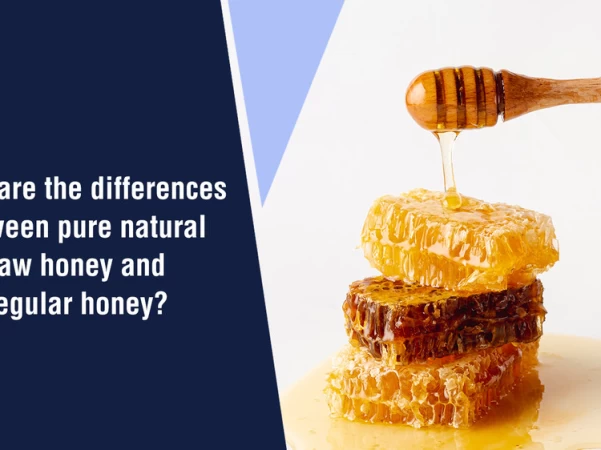
All of us believe that natural raw honey is better to be used and must be preferred for daily consumption. Do you think raw honey is healthier than regular honey? Let’s know the facts:
Raw Honey
Raw honey can be best explained as – the honey taken from beehives is served in intact form, which means nothing added or processed.
Raw honey is the purest form of honey, which is brought directly from honeycombs. The only tweak is the removal of small bits of debris including beeswax, pollens, and other wastes. The beekeepers do not pasteurize the honey and keep the honey in its purest form.
In appearance, raw honey appears cloudy or opaque because it contains all the elements that we don't find in the regular honey.
Regular Honey
Regular or pasteurized honey looks little transparent and smooth. This type of honey is processed to improve its appearance and to increase shelf-life. The production of regular honey includes pasteurization and filtration.
Filtration is also used to remove impurities like debris and other unwanted particles so that the colour becomes transparent and appealing. Some of the brands use additional processing to further refine honey's taste and smoothness. But this process can be resulting in the disappearance of the essential nutrients.
Basic differences between Raw and Regular Honey:
Raw honey is more nutritious
Raw honey contains approximately 22 amino acids and 31 different minerals, vitamins, and enzymes. However, the nutrients only present in the least amount, the most impressive thing about raw honey is that it contains nearly 30 types of bioactive plant compounds, which act as an antioxidants in our body.
Many clinical studies claim that these antioxidants in raw honey offer myriads of health benefits, including defence against infections, reduced inflammation, and lower risk of cardiovascular diseases. It also helps to decrease the chances of having cancer.
On the other hand, processed honey loses the number of antioxidants during the process of filtration and pasteurization.
Regular honey may have added sweeteners or sugar
Where Raw Honey is a natural sweetener, the regular honey may have added sugar or sweetener for the enhanced taste.
Clinically, added or processed sugar is always harmful to our health. This is the reason raw honey is also recommended to the diabetic patient as it doesn’t spike much sugar levels of blood in comparison to the processed sugar.
Most Regular Honeys have the probability of losing Pollen
To make honey, bees collect nectar and pollen by hundreds of flowers in the nearby areas. The health agencies found that Bee Pollen is highly nutritious, which contains over 250 substances including, vitamins, minerals, amino acids, micronutrients, fatty acids, and antioxidants.
The bee pollen is found extremely beneficial in reducing inflammation and improving liver functioning. It also offers decent protection against cardiovascular diseases.
What are the risks of eating raw honey?
Eating raw honey always arises a question – Is it safe to consume raw honey?
The bacteria – Clostridium botulinum can be found in raw honey, which may be harmful to babies or children. Doctors do not recommend raw honey for the babies who are less than the age of one because it may cause botulism poisoning, which may result in paralysis.
However, adults are not prone to have the side-effects of eating raw honey because botulism is very rare among adults and older children.
Where to buy the high quality raw or regular honey?
It is always recommended to consume raw honey as the nutrition value remains intact in it. However, it is not easy to find raw honey in the market, but a few brands like Nutrimoo offers pure natural honey, reviewed by a lot of consumers.
The first thing to notice in pure honey is its dark and non-transparent colour.
If it is not raw it should not be processed too much by added sugar or other sweeteners. Plus, it should not be pasteurized as it may wash away the quality of pollen and other nutrients of honey.